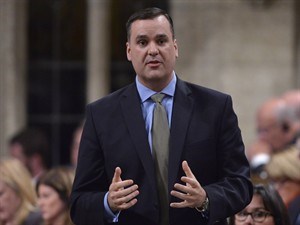
Minister of Industry James Moore responds to a question during Question Period in the House of Commons Tuesday June 17, 2014 in Ottawa. Moore says he's on a mission to create a true free trade zone within Canada and expects to hand officials a mandate to start the process of negotiating with provinces as early as this fall.
Image Credit: THE CANADIAN PRESS/Adrian Wyld
July 11, 2014 - 3:56 AM
OTTAWA - Industry Minister James Moore says he's on a mission to create a true free trade zone within Canada and expects to hand officials a mandate to start the process of negotiating with provinces as early as this fall.
Moore said in an interview Thursday the federal government will be issuing a paper "soon" detailing the failures of the 1995 Agreement on Internal Trade that was supposed to bring down inter-provincial barriers.
"It traces ... how it does not serve us as a status quo document moving forward," he said.
As well, the government will go ahead in implementing a budget pledge to create an Internal Trade Barriers Index so Canadians can see all the protectionist rules provinces have enacted.
On Wednesday, Western Premiers Christy Clark, Dave Hancock and Brad Wall of British Columbia, Alberta and Saskatchewan released a letter they sent to other premiers also calling for movement on the issue that has stymied policy-makers for decades.
Although most governments have tended to talk a good game about the benefits of free trade, most have tended to pass laws and regulations that protect local sectors and jobs from competition from out-of-province Canadians.
Moore says the practices are costing tens of billions of dollars a year — one study has estimated it at $50 billion — in lost business opportunities and lost jobs, in addition to added costs and less choices for consumers from restricting movement of products.
The Organization for Economic Co-operation and Development has cited inter-provincial trade restrictions as a key reason for Canadian firm's low productivity performance.
Moore admits the problem has been recognized for years and federal governments have long urged provinces to become more open, only to be met by mostly a stone wall. There has been some progress, including a regional deal between B.C., Alberta and Saskatchewan in 2010, but there has also been some backward steps.
"The difference this time is there is no separatist government in Quebec, there's no NDP government in B.C., no NDP government in Nova Scotia either, and I think we have pro-growth, pro-free trade governments elected all across the country," he said.
"Number two is the imperative for us to do it. In six, seven short years we've gone from having free trade agreements with five countries to today having free trade with 43 countries around the world," he added, counting the yet to be finalized deal with the European Union.
More said he welcomes the Western proposal as evidence of a real change in provincial attitudes on the issue.
But as Finance Minister Joe Oliver and his predecessor Jim Flaherty discovered on another issue — the national security regulator — obtaining provincial buy-in on a federal initiative can be difficult. After eight years of trying, Ottawa has only been able to reach agreement with four provinces, as was announced with great fanfare Wednesday.
Evidence of a push-back on freer internal trade was evident Thursday after Ontario Finance Minister Charles Sousa noted that while he agrees in principle, a number of sectors in the province are strong because they are protected.
The most often-cited example of restricted trade is wine, even though Canadian wines are exported internationally and spirits from around the world are sold throughout the country.
Moore said the most damaging are restrictions in labour mobility, investment mobility and provincial and municipal government procurement.
"Canadians are pretty stunned at the scale of trade barriers we have in this country, the consequences it has for economic growth and the pitiful arguments that exist for the trade barriers," he said. "All of the arguments in the world are in front of us to move forward in a substantive way."
Although he gave few details, More said a new deal should include an effective enforcement mechanism and proceed with the assumption inter-provincial movement is assumed in all matters unless specifically prohibited.
"The fact that we have greater free trade access for foreign investors and foreign firms wanting to do business in Canada than often Canadian firms have access to the Canadian marketplace, is something that is no longer tolerable," he said.
News from © The Canadian Press, 2014